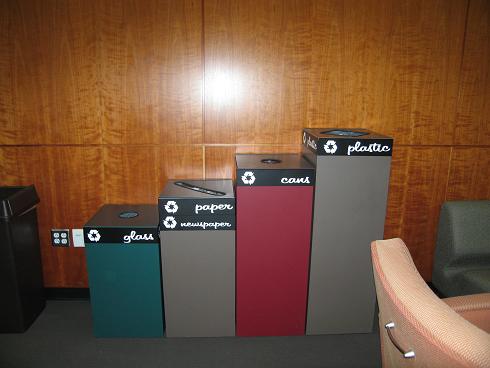Last week was “Cleanup Week1” in Pella, where we live. There are two Clean Up Weeks, one fall, and one spring in Pella. Normally, one day of every week the Pella waste disposal trucks2 haul3 away garbage from residences to the regional landfill4. Paper, bottles and cans are recycled5 on the same days. Other waste items6 such as electronic and electrical appliances7, old car batteries8, car tires, and waste paints9 are also collected twice a year by a locally sponsored10 program. The collective name for old or worn out items11 is trash12.
Americans are finally trashing13 our wasteful habit of throwing old things away14. In 2005, we generated less garbage and recycled more waste15. This was the first time ever that our government has recorded a decline16 in the amount of trash produced. The United States made 245.7 million tons of garbage in 2005, about 1.6 million tons less than in 2004 according to the EPA [Environmental Protection Agency17.] That means an average of about 4.5 pounds of garbage per person per day for our residential families18. That is a good start, and we can probably improve this reduction of waste as we continue to work at recycling.
Nearly one-third of our trash was recycled in 2005, and the EPA has set a goal for us to recycle 35% of our trash by 2008. That would be a big change from 1980, when only 10% of trash was recycled in the United States. Kate Krebs, the executive director of the National Recycling Coalition19, a citizen’s organization, has launched20 a comprehensive education campaign21 to teach people what to recycle and where to do it.
One of the newest targets22 for recycling; electronic equipment waste, is the fastest growing part of the nation’s trash. In 2005, about 1.5 million to 1.9 million tons of used and unwanted electronics items were discarded23, mainly in landfills. Only 345,000 to 379,000 tons were recycled. The recycling of computers, printers, telephones, cell phones, microwave ovens, etc, as well as rubber automobile tires has recently become a serious recycling effort in the U.S. Automobile tires, used oil (paint), and batteries were previously24 wasted, but now the oil and batteries are recycled, and used tires are ground25 to small pieces and used to build all-weather playing fields for football, running tracks, and playgrounds.
Recycling is important to all of us, because it helps prevent greenhouse gas emissions26 and saves energy. The EPA says that our efforts in 2005 saved the energy equivalent27 of 11 billion gallons of gasoline. This is good news to me, and to all Americans, and it should be encouraging28 to other countries throughout the world. Some of these started recycling long before the U.S. took it seriously.
My family has two phones, two microwave ovens, an old computer printer and four car tires in our garage. We will soon learn when our local recycling of electronic items, electrical appliances, and car tires are scheduled for this fall season. As the computer experts say, “Garbage in – garbage out.29” It never ends!
Notes:
1. “Cleanup Week”: a designated week in which waste items may be left out at the street to be carried off by the city trucks to the landfill area (清除废物周,该周内市里派车将置放在路边的废物拉到垃圾填埋场). Actually, some of these articles are still useful, and some people go around the city looking for items they’d like to have, and they pick them up and take them home, or prepare them to be sold as used items.
2. waste disposal trucks: trucks specially provided with parts to load trash and to carry it to the dump landfill (垃圾车).
3. haul: carry something or somebody to some destination (拖运).
4. regional landfill: an area set aside for the disposal and burying of waste materials; often done on a county or multi-county basis rather than for individual cities (地区垃圾填埋场).
5. recycled: collected and used again for another product (回收利用).
6. waste items: things that are no longer useful; i.e. glass, paper, tin cans, etc. (废弃物,如玻璃,纸张,听装罐等).
7. electrical appliances: electronic and electrical appliances, phones, radios, T.V.s etc. (家用电器)
8. batteries:电池
9. waste paints: unused paint left over which is no longer useable or wanted (剩下不用的油漆).
10. locally sponsored: supported by the city, district, or county (由地方上资助的).
11. old or worn out items: 旧的或者用坏了不能再用的东西
12. trash: 废物,垃圾
13. trashing: throwing out or discarding; no longer a useful item, so of little value (丢弃废物).
14. wasteful habit of throwing old things away: 把旧东西丢掉这种很浪费的习惯
15. In 2005, we generated less garbage and recycled more waste: 2005年,我们产生的垃圾更少了,回收利用了更多的废物。
16. decline: 减少
17. Environmental Protection Agency: a U.S. government organization which is given the responsibility for protecting the environment, and for assuring that the public is not endangered by faulty disposal methods (环保局,美国政府机构,负责保护环境以及确保公众不受不正当的垃圾处置方法的危害).
18. residential families:.住户
19. National Recycling Coalition: 全国废物回收利用联合组织
20. launched: has begun, or started on a process or task (发起).
21. comprehensive education campaign: 全面的教育运动
22. targets: 目标
23. discarded: thrown away, got rid of (丢弃).
24. previously: 以前
25. ground: cut or pulverized to very small pieces or a powder-like material (磨碎,碾碎).
26. emissions: 释放
27. equivalent: 等量物
28. encouraging:令人鼓舞的
